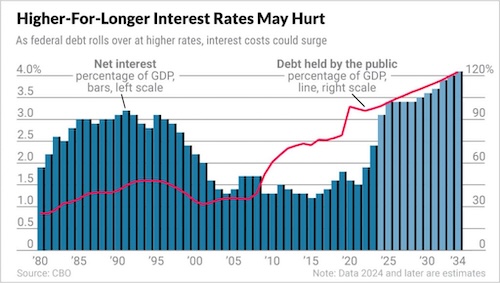
CBO Releases Updated Budget and Economic Outlook: 2024 to 2034
Stabenow uses CBO updates to make her farm bill case
The Congressional Budget Office (CBO) released its updated projections for the federal budget and economy from 2024 to 2034. Link to report.
Key highlights include:
Budget projections:
Changes in budget projections:
Economic projections:
Immigration surge:
Of note: CBO says that one culprit for the larger deficit this year is Congress’s recent military aid bill. But overall defense spending is still falling as a share of the economy and is expected to hit a postwar low of 2.8% of GDP in 2034. Also, if spending as a share of GDP remained at the pre-pandemic average, the deficit would be roughly $890 billion this year and $13.4 trillion smaller than CBO’s 10-year projection. This would keep debt as a share of GDP at roughly 90%.
Bottom line: Phillip L. Swagel, CBO's Director, emphasizes that these projections incorporate the impacts of the immigration surge and recent legislative changes on the federal budget and economy.
— CBO projects $1.9 trillion federal budget deficit for FY 2024. The Congressional Budget Office (CBO) estimates that the federal budget deficit for FY 2024 will reach $1.9 trillion, which is $400 billion higher than the estimate from four months ago. ($300 billion larger than last year’s deficit). The increase is attributed to President Biden's student loan forgiveness program (which CBO estimates could cost $211 billion this year above what it estimated in February), spending on Ukraine, Israel, and the Indo-Pacific region, slow recovery of bank failure costs by the FDIC, and higher Medicare spending (higher enrollment). CBO increased its Affordable Care Act (ACA/ObamaCare) spending estimate by $22 billion for this year and $244 billion over the next decade. It also raised its ACA enrollment projection by four million for this year and an average of three million over the next 10 years.
Of note: Over the next decade, the CBO projects the deficit will total $24 trillion. Link to report.
— The interest burden of the debt is significant. According to EconoFact Chats (link):


— CBO is big player in farm bill negotiations. The CBO is the official scorekeeper of legislative proposals and in release a farm bill baseline. The ongoing farm bill debate has a $1.51 trillion baseline over ten years. While CBO on Tuesday updated its forecasts, the farm bill baseline remains the same because House Ag Chair GT Thompson (R-Pa.) got his proposal approved in his panel by the end of May.
CBO now says USDA’s use of its Section 5 authority under the CCC would total $12 billion from fiscal year (FY) 2025 through 2034. In February, USDA estimated that it would spend $15 billion over that period. But either tally is nowhere near the $50 billion or more the House Agriculture Committee needs to fund commodity program increases.
Link to CBO estimates of CCC spending
Link to CBO June 2024 baseline
Link to CBO June 2024 SNAP spending | Another link to CBP on SNAP
— Stabenow uses CBO updates to make her farm bill case. The new CBO projections “prove what we have been saying all along: the House Republican farm bill is unpaid-for, relying on magic math and wishful thinking,” Stabenow said in a statement. “In exchange for blocking USDA’s ability to provide real time assistance to farmers through the CCC to address emerging challenges, House Republicans received only a small fraction of the $50 billion hole they need to fill to pay for their bill," she said.
Stabenow said her Rural Prosperity and Food Security Act “is meaningful and responsible. And, importantly, it does not fracture the farm and food coalition that is the foundation of every successful farm bill. I did the hard work of securing new resources outside of the farm bill through $2.3 billion invested in trade promotion and food aid and a $5 billion commitment in bipartisan offsets from my Leadership. It’s time to get real and stop the posturing and the rhetoric. It’s time to negotiate in reality. My door is open.”
Sen. John Boozman (R-Ark,) ranking member of the Senate Ag Committee, told us via an AgriTalk interview on Tuesday (link) that he thinks the House needs to pass its farm bill to put pressure on Stabenow and Democrats.